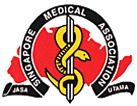
THESMANEWS
Present Issue
Past Issues
Journals
Present Issue
Past Issues
Letters to the Editor


This site is supported by Health ONE
SINGAPORE PHYSICIAN PLEDGE REDUX
It is again time for the Singapore Physician’s Pledge. Two hundred and fifty doctors pledged their covenant to the public to practise medicine in the spirit of the medical profession on 2 May this year.
The patient’s interest should be every doctor’s prime consideration. Two senior doctors have shared their views on ethical practice. The presentations are printed as lead articles in this edition.
The Hippocratic Corpus recognised the interaction of ‘business’ and patient-health moral considerations, and urged that the former be subordinated to the latter.
During the 1800s with the growth of complexity in both scientific knowledge and the organisation of health services, the medical ethical codes addressed themselves to elaborate rules of conduct to be followed by the members of the newly emerging national medical associations. (Sohl P, Bassford HA)
Modern developments in science, technology and medicine have resulted in an unprecedented interest in ethical and moral issues in the practice of medicine. Changes threaten to erode the traditional ethos of practice and to transform medicine into a marketable commodity. (Benatar SR)
Ethics in medicine must undertake a new beginning. It cannot be normative ethics, it cannot be situation ethics, it must be differential ethics. It has to respect rules and declarations, but it has also to compare the benefits and risks. In the center of such ethics stands the responsibility of the physician. To assume this responsibility, the physician needs knowledge, the ability to make decisions and a conscience. (Winau R)
The Singapore Physician’s Pledge is therefore a guide for the doctor in times of dilemma. Practice of medicine will never be dilemma-free. There will always be the need to balance the conflicting interests of the parties related to medical care - the patient, his significant others, the doctor, society and commercial considerations. It is important to recognise that
medical ethics is not for the righteous. It is a decision-making tool for everybody. It is also important that patients and the public share the ethical values of their doctors and the medical profession.
Hence, as our new doctors pledge to serve humanity in a noble way, it is also a time for reaffirmation for all doctors in practice to do likewise and be good role models.
KREFERENCES
Sohl P, Bassford HA. Codes of medical ethics: traditional foundations and contemporary practice. Soc Sci Med 1986; 22(11):1175-9.
Benatar SR. Traditional and evolving concepts in medical ethics. Med Law 1989; 7(5):423-6.
Winau R. The hippocratic oath and ethics in medicine. Forensic Sci Int 1994, Dec 16;69(3):285-9.
A/PROF GOH LEE GAN